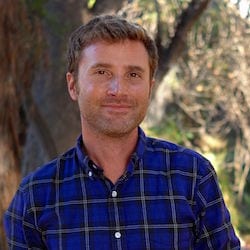Noah Whiteman

Noah Whiteman
Competition: US & Canada
Noah Whiteman is an evolutionary biologist — raised deep within Minnesota’ boreal forest— whose research combines natural history exploration with molecular biology to study host-parasite interactions. His dissertation at the University of Missouri-St. Louis demonstrated how parasites can serve as evolutionary tags to illuminate the colonization history of endangered Galápagos birds. Whiteman then completed an NIH postdoctoral fellowship at Harvard University, where he used plants as models for studying innate immunity. This was followed by faculty appointments at the University of Arizona and then at the University of California, Berkeley. His interest in the ancient battle between toxic plants and their enemies led to pioneering CRISPR-Cas9 genome editing research that retraced how monarch butterflies evolved to resist and repurpose heart poisons from their milkweed host plants. He is now using co-evolution as a window into understanding our own reliance on plant toxins, from everyday spices and life-saving medications, to addictive stimulants and deadly narcotics. Whiteman is engaged in facilitating the public understanding of evolution, and he has been featured by PBS , NPR, and The New York Times. His research has been supported by an NIH Outstanding Investigator Award, NSF, the National Geographic Society, and the Rocky Mountain Biological Laboratory.
Photo Credit: Michael Wan, University of California, Berkeley